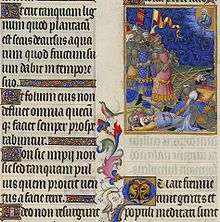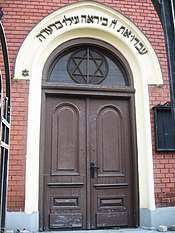Psalm 2

Psalm 2 is the second Psalm of the Bible. Psalm 2 does not identify its author with a superscription. Acts 4:24-26 in the New Testament attributes it to David.[1] According to the Talmud (Berakhot 10b), Psalm 2 is a continuation of Psalm 1.[2]
Background and themes
In the general sense, Psalm 2 is interpreted as referring to King David, God's anointed, defeating the enemies of Israel who gather against her. In addition, Psalm 2 is often considered to be messianic, referring to the Messianic Era when the kingdoms of the world gather against Israel and are defeated, and Jerusalem becomes a house of prayer for the nations. In this vein, the "messiah" of Psalm 2 is interpreted not as David but as the future Messiah, who will restore Israel to its former glory and bring world peace. The Talmud teaches (Sukkah 52a):
Our Rabbis taught: The Holy One, blessed be He, will say to the Messiah, the son of David (May he reveal himself speedily in our days!), :Ask of me anything, and I will give it to you", as it is said, "I will tell of the decree ... this day have I begotten thee. Ask of me and I will give the nations for your inheritance" (Psalms 2:7-8).[3]
The Midrash teaches (Genesis Rabbah 44:8):
R. Jonathan said: "Three persons were bidden, 'Ask'—Solomon, Ahaz, and the King Messiah. Solomon: 'Ask what I shall give thee' (I Kings 3:5). Ahaz: 'Ask thee a sign' (Isaiah 7:11). The King Messiah: 'Ask of Me', etc. (Psalms 2:8)."[4]
Christian writers such as Gunkel[5] and Hans Joachin Kras[6] see the psalm as a song of the Judean king himself at the festival of his accession, while Hossfeld sees the psalm as merely being influenced by the Egyptian and Hellenistic royal ideology.[7]
In Matthew Henry's Concise Commentary (1708-12), verses 1-6 are viewed as threats against Christ's kingdom, verses 7-9 as promise to Christ as the head of this kingdom, and verses 10-12 as counsel to all to serve Christ.[8]
In Adam Clarke's commentary, verses 1-3 are viewed as opposition raised against the kingdom of Christ; verses 4-6 as Christ's victory, and the confusion of his enemies; verses 7-9 as the promulgation of the Gospel after his resurrection; and verses 10-12 as a call to all to accept it, because those who reject it will perish.[9]
In a most animated and highly poetical style, the writer, in "four stanzas of three verses each," sets forth the inveterate and furious, though futile, hostility of men to God and His anointed, God's determination to carry out His purpose, that purpose as stated more fully by His Son, the establishment of the Mediatorial kingdom, and the imminent danger of all who resist, as well as the blessing of all who welcome this mighty and triumphant king.
Text
Hebrew Bible version
Following is the Hebrew text and an English translation of Psalm 2:[10]
| Verse | Hebrew | English |
|---|---|---|
| 1 | לָמָּה רָֽגְשׁ֣וּ גוֹיִ֑ם וּ֜לְאֻמִּ֗ים יֶהְגּוּ־רִֽיק | Why have nations gathered and [why do] kingdoms think vain things? |
| 2 | יִֽתְיַצְּב֨וּ | מַלְכֵי־אֶ֗רֶץ וְרֽוֹזְנִ֥ים נֽוֹסְדוּ־יָ֑חַד עַל־יְ֜הֹוָה וְעַל־מְשִׁיחֽוֹ | Kings of a land stand up, and nobles take counsel together against the Lord and against His anointed? |
| 3 | נְֽנַתְּקָה אֶת־מֽוֹסְרוֹתֵ֑ימוֹ וְנַשְׁלִ֖יכָה מִמֶּ֣נּוּ עֲבֹתֵֽימוֹ | "Let us break their bands and cast off their cords from us." |
| 4 | יוֹשֵׁ֣ב בַּשָּׁמַ֣יִם יִשְׂחָ֑ק אֲ֜דֹנָ֗י יִלְעַג־לָֽמוֹ | He Who dwells in Heaven laughs; the Lord mocks them. |
| 5 | אָ֚ז יְדַבֵּ֣ר אֵלֵ֣ימוֹ בְאַפּ֑וֹ וּבַ֖חֲרוֹנ֥וֹ יְבַֽהֲלֵֽמוֹ | Then He speaks to them in His wrath; and He frightens them with His sore displeasure. |
| 6 | וַֽאֲנִֽי נָסַ֣כְתִּי מַלְכִּ֑י עַל־צִ֜יּ֗וֹן הַר־קָדְשִֽׁי | "But I have enthroned My king on Zion, My holy mount." |
| 7 | אֲסַפְּרָ֗ה אֶ֫ל חֹ֥ק יְהֹוָ֗ה אָמַ֣ר אֵ֖לַי בְּנִ֣י אַ֑תָּה אֲ֜נִ֗י הַיּ֥וֹם יְלִדְתִּֽיךָ | I will tell of the decree; The Lord said to me, "You are My son; this day have I begotten you. |
| 8 | שְׁאַ֚ל מִמֶּ֗נִּי וְאֶתְּנָ֣ה ג֖וֹיִם נַֽחֲלָתֶ֑ךָ וַֽ֜אֲחֻזָּֽתְךָ֗ אַפְסֵי־אָֽרֶץ | Request of Me, and I will make nations your inheritance, and the ends of the earth your possession. |
| 9 | תְּרֹעֵֽם בְּשֵׁ֣בֶט בַּרְזֶ֑ל כִּכְלִ֖י יוֹצֵ֣ר תְּנַפְּצֵֽם | You shall break them with an iron rod; like a potter's vessel you shall shatter them." |
| 10 | וְעַתָּה מְלָכִ֣ים הַשְׂכִּ֑ילוּ הִ֜וָּֽסְר֗וּ שֹׁ֣פְטֵי אָֽרֶץ | And now, [you] kings, be wise; be admonished, [you] judges of the earth. |
| 11 | עִבְד֣וּ אֶת־יְהֹוָ֣ה בְּיִרְאָ֑ה וְ֜גִ֗ילוּ בִּרְעָדָֽה | Serve the Lord with fear, and rejoice with quaking. |
| 12 | נַשְּׁקוּ־בַ֡ר פֶּן־יֶאֱנַ֚ף | וְתֹ֬אבְדוּ דֶ֗רֶךְ כִּֽי־יִבְעַ֣ר כִּמְעַ֣ט אַפּ֑וֹ אַ֜שְׁרֵ֗י כָּל־ח֥וֹסֵי בֽוֹ | Arm yourselves with purity lest He become angry and you perish in the way, for in a moment His wrath will be kindled; the praises of all who take refuge in Him. |
King James Version
- Why do the heathen rage, and the people imagine a vain thing?
- The kings of the earth set themselves, and the rulers take counsel together, against the Lord, and against his anointed, saying,
- Let us break their bands asunder, and cast away their cords from us.
- He that sitteth in the heavens shall laugh: the Lord shall have them in derision.
- Then shall he speak unto them in his wrath, and vex them in his sore displeasure.
- Yet have I set my king upon my holy hill of Zion.
- I will declare the decree: the Lord hath said unto me, Thou art my Son; this day have I begotten thee.
- Ask of me, and I shall give thee the heathen for thine inheritance, and the uttermost parts of the earth for thy possession.
- Thou shalt break them with a rod of iron; thou shalt dash them in pieces like a potter’s vessel.
- Be wise now therefore, O ye kings: be instructed, ye judges of the earth.
- Serve the Lord with fear, and rejoice with trembling.
- Kiss the Son, lest he be angry, and ye perish from the way, when his wrath is kindled but a little. Blessed are all they that put their trust in him.
Uses
Judaism
Catholicism
According to the Rule of St. Benedict (530 AD), Psalm 1 to Psalm 20 were mainly reserved for the office of Prime. This psalm was chosen by St. Benedict of Nursia for Monday of the office of Prime, in the Rule of St. Benedict of 530 it was recited or sung between Psalm 1 and Psalm 6.[12]
In the Liturgy of the Hours, Psalm 2 is sung or recited in the Office of Readings of the Sunday of the first week,[13] with Psalm 1 and Psalm 3. Every Tuesday, the faithful of Opus Dei, after invoking their Guardian Angel and kissing the rosary, recite Psalm 2 in Latin.[14]
Musical settings
In 1567, Thomas Tallis set Psalm 2, "Why fum'th in sight", for 9 Psalm Tunes for Archbishop Parker's Psalter.
Psalm 2 is one of the psalms used in George Frideric Handel's Messiah, where it is featured prominently towards the end of Part II. There is a long-standing custom of standing after verse 9 in Handel's Messiah.
In France, Michel-Richard de Lalande in 1706 made his grand motet (S.70) on this Psalm. Verse 8 of Psalm 2 is used in the song "You Said" by Reuben Morgan.
Controversy
English-speaking Protestant Christians commonly (but not always) translate verse 12 as "Kiss the son", as in the King James Version. The most common Jewish interpretation is "Embrace purity", an interpretation close to that of Catholics, who traditionally follow the Vulgate and translate the phrase as "Embrace discipline". To translate as "Kiss the son", the word "bar" must be read as Aramaic ("son", but in Hebrew, "son" is "ben") rather than Hebrew ("purity") or Septuagint and Vulgate "discipline", "training", "teaching". (The New American Bible reconciles by combining verses 11 and 12 of the other Bibles into a whole new verse 11.[15]) Some Jewish authors have accused Protestant Christians of arbitrarily choosing to interpret the word as in a different language to give the text a meaning more favourable to Christians ("son", understood as Jesus). Protestants, however, cite other places in the Bible with isolated Aramaic words found in Hebrew like the same word "bar" occurring in Proverbs 31:2.[16][17][18]
References
- ↑ Acts 4:24–26 It is also called "the second psalm" in Acts 13:32–33.
- ↑ Abramowitz, Rabbi Jack (2018). "Psalms – Chapter 2". Orthodox Union. Retrieved 25 August 2018.
- ↑ Soncino Talmud edition. Online here
- ↑ Soncino Midrash Rabbah (vol. 1, pp. 365-366)
- ↑ Gunkel, Hermann: Die Psalmen, (Göttingen 1926), p5.
- ↑ "Hans-Joachim Kraus, Psalmen 1-63. 1. Teilband, (Neukirchen-Vluyn 1972), p13f.
- ↑ siehe Hossfeld, Frank-Lothar und Erich Zenger: Die Psalmen, Bd. 1, Psalm 1-50, (Würzburg 1993), p50.
- ↑ Matthew Henry’s Concise Commentary on Psalm 2
- ↑ Clarke's Commentary on Psalm 2 Archived 2011-11-28 at the Wayback Machine.
- ↑ "Tehillim - Psalms - Chapter 2". Chabad.org. 2018. Retrieved August 25, 2018.
- ↑ Brauner, Reuven (2013). "Shimush Pesukim: Comprehensive Index to Liturgical and Ceremonial Uses of Biblical Verses and Passages" (PDF) (2nd ed.). p. 31. Retrieved 25 August 2018.
- ↑ traduction par Prosper Guéranger,Règle de saint Benoît, (Abbaye Saint-Pierre de Solesmes, réimpression en 2007).
- ↑ Le cycle principal des prières liturgiques se déroule sur quatre semaines.
- ↑ De spiritu et de piis servandis consuetudinibus - (Del Espíritu y de las Costumbres, Roma, 1990) édition- n° 116.
- ↑ "Archived copy". Archived from the original on 2012-10-21. Retrieved 2012-12-02.
- ↑ Parsons, John J. "Psalm 2 in Hebrew". Hebrew for Christians.
- ↑ "12. Objections to 2nd and 22nd Psalm". truth.net.
- ↑ "Jewish Interpretations of "Bar" as "Son" in Psalm 2:12". Jews for Jesus. 1997.
| Wikisource has original text related to this article: |
| Wikimedia Commons has media related to Psalm 2. |
